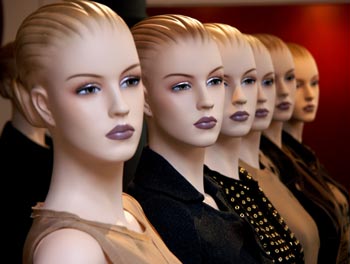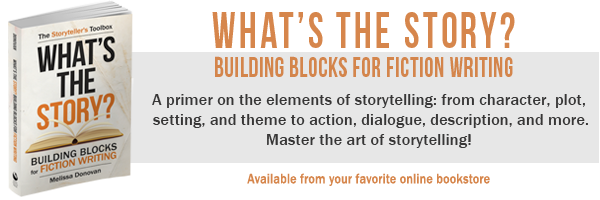I was recently reading a novel, and a few chapters in, I realized I had mixed up two of the main characters. In fact, I had been reading them as if they were a single character. I’m a pretty sharp reader, and this has never happened before, so I tried to determine why I’d made the mistake. Was I tired? Hungry? Not paying attention?
I went back and reviewed the text and noticed that these two characters were indistinct. They were so alike that without carefully noting which one was acting in any given scene, it was impossible to differentiate them from each other. They were essentially the same character. Even their names sounded alike.
This got me to thinking about the importance of building a cast of characters who are unique and distinct from each other instead of a cast of stock characters who are mere clones of one another.
Stock Characters
We sometimes talk about stock characters in literature. You know them: the mad scientist, the poor little rich kid, the hard-boiled detective. These characters have a place in storytelling. When readers meet a sassy, gum-popping waitress in a story, they immediately know who she is. They’ve seen that character in other books and movies. Maybe they’ve even encountered waitresses like her in real life. These characters are familiar, but they’re also generic.
When we use a stock character as a protagonist or any other primary character, we have to give the character unique qualities so the character doesn’t come off as generic or boring. It’s fine to have a sassy, gum-popping waitress make a single appearance in a story, but if she’s a lead character, she’s going to need deeper, more complex development so the readers no longer feel as if they already know her. She has to become fresh and interesting.
Stieg Larsson did this brilliantly in The Girl with the Dragon Tattoo and the sequels that made up the Millennium trilogy (aff links). At first the protagonist, Lisbeth Salander, seems like a surly punk, the kind of character we’ve seen a million times before. As the story progresses and Lisbeth moves to center stage, we learn there’s more to her than meets the eye. She’s antisocial, and she’s a computer genius. She’s bold, brave, and tough. She’s not just some surly punk. She is a moral person with unique challenges — one of the most intriguing characters in contemporary fiction.
Cloning Characters
Stock characters are often taken from source material, sometimes as an homage and other times as a blatant rip-off. Such characters are problematic when they feature prominently in a story and have no traits that differentiate them from the character upon which they are based. Do you want to read a story about a boy wizard named Hal Porter who wears glasses and has a scar on his forehead? Probably not, unless it’s a parody of Harry Potter, whom we all know.
You can certainly write a story about a young wizard who is based on Harry Potter, but you have to differentiate your character from Harry. Make the character a girl, give her a hearing aid instead of glasses, and come up with a memorable name that doesn’t immediately bring Harry Potter to mind. And give your character her own personality and challenges.
As the book I was recently reading demonstrates, we also have to watch out for cloning characters within our own stories. For most writers, this is a bigger problem than cloning characters out of other authors’ stories.
Think about it: you are the creator of all the characters in your story. You might have based them on people or characters you know and love (or loathe). You might have conjured them from your imagination. But they are all coming from you: your thoughts, your experiences, and your voice.
While I’ve never mixed up two characters in a book I was reading before, I have noticed that characters who act, think, and speak similarly are common. And while a cast of characters who are similar to each other in every way imaginable doesn’t necessarily make a story bad, a cast of characters who are noticeably distinct from each other is much better.
Nature vs. Nurture: How to Avoid Cloned Characters
Cloning is the practice of making a copy of something, an exact replica. You can clone a human being (or a character), but once the clone comes into existence, it will immediately start changing and becoming different from the original. Its personal experiences will be unique. By nature, the original and the clone are exactly the same, but nurture (or life experience) will cause the clone to deviate from the original.
Here are some tips to make sure your characters are unique and not clones of each other or any character or person they are based on:
- Give your characters distinct and memorable names. Avoid giving characters names that sound alike. Don’t use names that start with the same letter and are the same length, and don’t use names that rhyme.
- Unless you’re writing a family saga, make sure your characters don’t all look alike. Try developing a diverse cast of characters.
- Characters’ speech patterns will depend on where they’re from, but individuals also have their own quirky expressions and sayings. Use dialogue to differentiate the characters from each other. Maybe one character swears a lot while another calls everyone by nicknames.
- Create character sketches complete with backstories. If you know your characters intimately, you’ll be less likely to portray them as a bunch of clones.
- To help you visualize your characters, look for photos of actors, models, and other public figures that you can use to help your imagination fill in the blanks.
- Once you’ve created your cast, ask whether any of them are stock characters. If any of your primary characters feel like stock characters, make them more unique.
Are You Using Stock Characters? Are Your Characters a Bunch of Clones?
The main problem with the book I mentioned at the beginning of this post was that there were two characters who were essentially functioning as a single entity, at least for the first four or five chapters, which is as far as I got in the book. Together, they shared the same purpose or function within the story. The best fix for that problem would have been to combine the two characters into a single character, something I have had to do in one of my fiction projects that had a few too many names and faces.
How much attention do you pay to your characters when you’re writing a story? What strategies do you use to get to know your characters and make sure they are all unique? Have you ever noticed stock characters or cloned characters in a story you’ve read? Share your thoughts by leaving a comment, and keep writing!






My favorite technique for learning about a character that isn’t forthcoming is to ask their family, friend, or enemy to talk about or describe them. I learn the most interesting things!
Ooh, that’s a great exercise!
Love this idea.
With the sudden growth of self-publishing, I have noticed a lot more traditionally published stories letting more questionable work get to press. I have some pretty high standards, but I know when there are some companies trying to grasp at whatever they can to retain their market.
Onto the topic at hand: The real problem is if you don’t live or experience whatever it is you are writing, it is far easier to do the stock character as a placeholder and then forget they were meant to hold a place in the first place.
There are some great ways to build characters, but one of my all time favorites is through NLP. It really gets you deep in their thoughts and allows you to see what you might have missed if you were only thinking about it through your mind.
Great subject, and one that can break a story if not done properly. Thanks for sharing!
Thanks for your comment, Matthew. In my experience, traditional publishers were already letting questionable work go to press before self-publishing exploded. In the two or three years before that explosion, I picked up several books that I simply could not suffer through. Some were too highbrow (to the point that they didn’t even make sense); others were sloppy. I had been studying the traditional publishing industry during those years, and I felt like self-publishing hit the scene at exactly the right time, when authors were getting horrible contracts, low advances and royalties, and publishers were putting out sub-par work. I think self-publishing will keep traditional publishers on their toes, and that’s a good thing.
I remember the days when there were no typos, grammar or spelling mistakes in books.
Now, I find most books have at least one or two, some have lots. And it’s not just indi books.
*Give your characters distinct and memorable names. Avoid giving characters name that sound alike. *
I used to make this mistake when writing my novelettes.
It got to the point that I even ended up confusing myself as to which character was which. :S
It’s funny — this was always a pet peeve of mine, even going back to when I was a kid. It wasn’t all that long ago (maybe six years?) that I started coming across people saying, “Don’t do that! Give your characters distinct names!” I was relieved that it wasn’t just me.
This article brought to my mind classics like ‘Little Women’ and ‘Great Expectations’ – both written about large families of girls – in which each young lady was given a very individual personality. Their names also seemed to reflect the nature of those characters, e.g. Beth was a soft, pretty girl; Jo was a tomboy, etc. (Or did the girls adopt the personality to suit the names they were given?)
Thanks, Melissa. Food for thought, indeed.
I just made myself laugh at the silly gaffe I made above – of course it is ‘Pride and Prejudice’ I was talking of, not ‘Great Expectations’. Forgive me – I had a ‘senior moment’ as I call it.
You bring up a great point about names — they are so much more powerful when they reflect a character’s personality. I often agonize over naming my characters for that reason.
It’s always interesting how different writers get to know their characters. For the longest time, I was really interested in what cars each character drove, as that can be quite telling about someone’s personality. Details like that are some of the little things I include to help differentiate characters, though I’m never sure when something is too subtle.
You’re right! That is interesting. I’m always obsessed with my characters’ careers! I don’t think I’ve given much thought to which cars they drive, though. It’s funny what each of us focuses on, isn’t it?
You are right about the names. I gave up on a book because of this. It was deliberate by the author. All the people in the ruling dynasty had to have a particular type of name. I got fed up with looking back to see who was who.
I often notice extra characters on TV shows… characters that seem not needed because other characters could easily carry on their actions and functions. I don’t see the point of cluttering up the story just to populate it with characters who serve no purpose. Your ideas about developing characters are great. Doing a character sketch or back story for every character is an excellent idea.